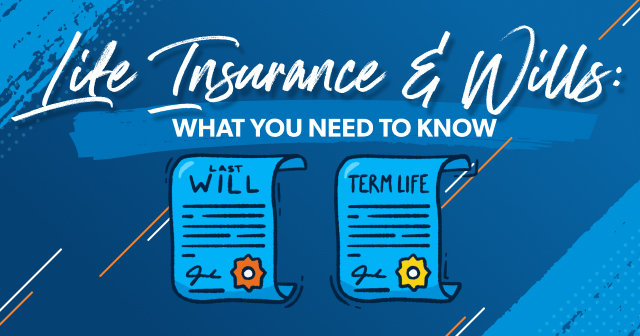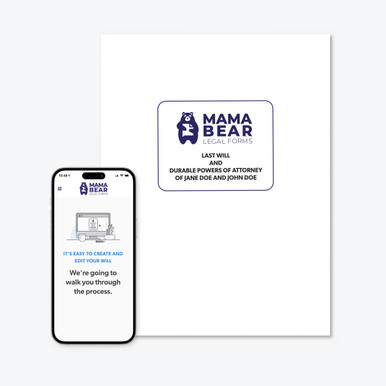Life Insurance and Wills: What You Need to Know
11 Min Read | Mar 5, 2025

You’ve probably heard of wills and life insurance. On their own, they’re pretty easy to understand. But maybe you don’t know exactly how they work together in a smart estate plan. (Lots of people assume they can do the same things—guess again!)
Well, get ready. We’ve got a simple breakdown of both tools here! What’s more, we’ll tell you everything you need to know about how wills and life insurance interact, and why most people need both.
Let’s check it out!
Life Insurance vs. Will: Basic Definitions
First, let’s define life insurance and wills. Many people know that both help you carry out your end-of-life wishes. But do they do the same thing as each other? Nope!
Life Insurance
Life insurance replaces your income when you die. It’s one huge way to take care of someone you love—called the beneficiary—if they depend on your income to live. So long as you send in your monthly payments, the life insurance company guarantees a sum of money (this should be 10–12 times your annual income) to your beneficiary (or beneficiaries) after you’re gone.
Save 10% on your will with the RAMSEY10 promo code.
(Psst . . . there are tons of life insurance products out there loaded with gimmicks. But the only type we recommend is term life insurance. It’s not only the most affordable, it also skips the bells and whistles and sticks to the job of replacing your income when you die. Go get some!)
When you have life insurance, it means peace of mind for you and those you love about the essential things—keeping the bills paid, the refrigerator full, and the wolves at bay—even when the unthinkable happens. It’s a must-have for anyone who’s still in debt, has dependents, or has a mortgage.
Will
What about a will? Your will is a legal document that spells out your wishes about who should get custody of minor children and who should get your stuff when you die. It’s also the easiest way to be sure everyone gets what they deserve without the pain of probate court making all those decisions. Simply put, this is another key end-of-life protection most people need—as in anyone 18 or older.
Wills and life insurance have something else in common: Both require you to name a beneficiary who will get the goods. Because both tools are designed to provide for your loved ones after your death, and both have beneficiaries, you may be wondering, Do I even need both? And how do they work together? Can one cancel out the other?
Let’s clear up the relationship now.
1 of 11
Will an online will work for you?
Find out if an online will works for you in less than 5 minutes.
Will an online will work for you?
Find out if an online will works for you in less than 5 minutes.
Do I Need a Will if I Have Life Insurance?
We’ve already said almost everyone needs life insurance as a hedge against an untimely death. It’s a small price to pay for huge peace of mind. But does having life insurance mean you don’t need a will? Not on your life!
Even if you do have life insurance, you still need a will in your estate plan. Why? Your term life policy can replace your future income, but only a will can preserve the wealth and property you already have today.
Pretty much everyone needs a will, regardless of where you are on your financial journey. Whether you’re talking about who gets your millions or who gets your minions . . . err, your minor children, either way a will is the only way to guarantee who gets what.
Think what could happen to your family if you died today with term life in place but no will. Sure, they’d get the death benefit to invest for the future and pay bills while they grieve. But here’s the thing. Without a will, your home, your vehicles, your cash—pretty much everything you’ve worked so hard for—will be up for grabs by the courts.
Your state will appoint a lawyer to figure everything out in probate court, and they’ll be paid from (you guessed it) your estate. And there’s no way to know what they’ll decide. What’s more, it could take years to get everything settled! Your family doesn’t need or deserve that kind of legal headache!
In case you’re wondering how probate affects life insurance, rest assured. The death benefit from your life insurance does not go through probate. It will be paid promptly once your family files a claim. (More on this later.)
Don't Know Where to Start With a Will?
Download our will worksheet to get started.
Life Insurance Beneficiary vs. Will Beneficiary
Here’s the rule of thumb: The only way to control who gets the payout from a life insurance policy is to name your beneficiary in that policy. On the other hand, your will also has a lot to say about who gets what. Let’s look at an example.
Meet Brandon. Sadly, he’s a widower, but thankfully he still has his twin children Betty and Freddy. After Brandon’s wife died, he updated his life insurance policy to make Freddy the beneficiary. But he didn’t forget about Betty—he made her the primary beneficiary of his estate in his will. He figures if anything bad happens, both his children will be provided for.
Life Insurance Calculator
You can get an idea of how much you need (and save some brain calories while you’re at it) by using this quick life insurance calculator.
What if My Life Insurance Policy Contradicts My Will?
Well, what if Brandon dies? Who gets what? In cases where there are different beneficiaries named, many people assume the will somehow trumps the life insurance policy. Nope! As it is written, Freddy gets the death benefit, and Betty gets all of their father’s stuff—unless Brandon updates the will to specify certain property or a portion of his estate to go to his son. (Wills are flexible like that as long as you’re still breathing.)
No matter what you write in your will—even if you tell the executor to make your life insurance beneficiary share the proceeds with other family—only the policy itself controls who will be the legal beneficiary of life insurance. So choose that beneficiary wisely. Maybe more importantly, discuss your estate plan with your entire family and with anyone you plan to give gifts to. They deserve to know your wishes today, to avoid surprises after you’re gone.
Is Life Insurance Part of an Estate?
Life insurance is usually not part of an estate. The one exception where a death benefit would become part of your estate is if the person you named as your life insurance beneficiary died before you and you forgot to name a new beneficiary. But you’re way too smart to forget an essential move like that, right?
But in most cases, the only person who can access your life insurance death benefit is the beneficiary you name. And while everything listed in a will must go through some level of probate to be sure it’s being distributed legally, the death benefit is different. Courts have nothing to do with that.
How Does a Life Insurance Policy Work Together With a Will?
Life insurance having its own beneficiary doesn’t mean the policy plays zero role in your estate planning.
Imagine you’ve named your spouse as the beneficiary of your $1 million death benefit. You can be confident they’re well provided for in the event you die. And that feeling should influence how you write your will. How so?
Well, with that much money guaranteed for your surviving spouse, you’d be comfortable naming your children as the beneficiaries of the cash in your bank account. It might also impact how you decide to distribute stuff like cars or real estate. (Keep in mind that jointly held property with another person—which can mean bank accounts or houses, among other things—will automatically go to the surviving co-owner.)
All these choices are entirely yours—just be sure you talk them over with your family and get both life insurance and a will in place today.
Bottom line: Life insurance replaces your income so your survivors can keep the Four Walls of their lives in place, but it doesn’t replace the need for a will. While life insurance is an awesome tool, it’s not legally part of your estate. To be sure your stuff goes where you want it, a will is also essential.
Interested in learning more about estate planning?
Sign up to receive helpful guidance and tools.
Who Needs a Will and Who Needs Life Insurance?
Again, most people need a will and life insurance. But to find the exceptions, let’s talk about the specific life situations where we’d recommend either tool.
When do you need life insurance?
There are so many good reasons to have this coverage. Here’s when it’s an absolute necessity:
- If you’re married. You’re both all in on everything together, and that has to include a plan for the other spouse to carry on and replace your income if the unthinkable happens.
- If you have young children. Got dependent kids? You owe it to them to have life insurance worth 10–12 times your annual income.
- If you’re an empty nester. Even if the kids are already gone, you might still be working to pay down your mortgage or build up that nest egg. And it could all be gone in a heartbeat if you pass without life insurance to replace your income.
Pretty much the only situation we’d recommend you going without life insurance is if you’re already self-insured. What’s that mean? It means you’re debt-free (including your house) and you have enough money banked to take care of your dependents. If that’s you, congratulations! But if it’s not, don’t worry. Just go (like, right now) and get term life coverage until you are self-insured. And you’ll get there eventually!
When do you need a will?
Everyone needs a will. Why? Because as hard as it is to face, none of us gets out of here alive. But the people you love deserve to enjoy all you’ve worked so hard to leave behind for them.
Here are the main reasons we so strongly recommend a will:
- It gives you control. It not only heads off any family fights about property, it also empowers your loved ones because they know they have a plan when you’re gone.
- It lets you give gifts. Who wouldn’t want to bestow certain keepsakes on specific loved ones? We all feel that. Whether it’s heirloom jewelry or your prized sports memorabilia, there’s probably someone special you want to give it to. Put it in your will!
- It skips or minimizes probate. Technically every estate goes through some form of probate. But the process is way easier and shorter with a legally binding will. And without one? Probate can become a nightmare of property disputes and custody battles. No way you want to leave that as a legacy!
Can You Put Life Insurance Benefits in a Trust?
Yes, you can put life insurance benefits in a trust! However, we don’t recommend using a trust—and especially making one the beneficiary of a life insurance policy—as an estate planning strategy for most people. Although trusts can be an awesome way to shelter wealth from taxes, this kind of protection is only really useful for huge estates. After all, estate taxes don’t kick in until an estate exceeds $12 million in value (and more than $24 million for married couples).1
That being said, there are two main kinds of trusts wealthy people might want to use as a beneficiary for life insurance. Both types are designed just for that purpose. They’re called irrevocable life insurance trusts (ILITs) and revocable life insurance trusts (RLITs).
As the names imply, the irrevocable kind is less flexible, while the revocable kind can be changed in certain situations. ILITs line up with the tax shelter strategy. As for RLITs, they work almost exactly like a normal insurance policy. The main difference with an RLIT is that the trustee can more easily take over the estate if you, the trust owner, become incapacitated.
Bottom line: The trust and life insurance combo doesn’t fit most people’s situation.
You Need Both a Will and Life Insurance
A smart estate plan includes both a will and life insurance. Thankfully, we have two RamseyTrusted partners who we highly recommend to cover both needs.
When it comes to wills, there’s no need to pay huge attorney fees. We recommend RamseyTrusted provider Mama Bear Legal Forms to help you create a will. You can choose the specific kind of will you need and plug in your information, and you’re done. No muss, no fuss. And no migraine from trying to figure it all out!
For term life insurance, our trusted friends at Zander Insurance have been helping people find the best policy to protect their family for more than 50 years. To make sure you have all of the coverage you need (and nothing you don’t), take the Coverage Checkup for a personalized action plan.





